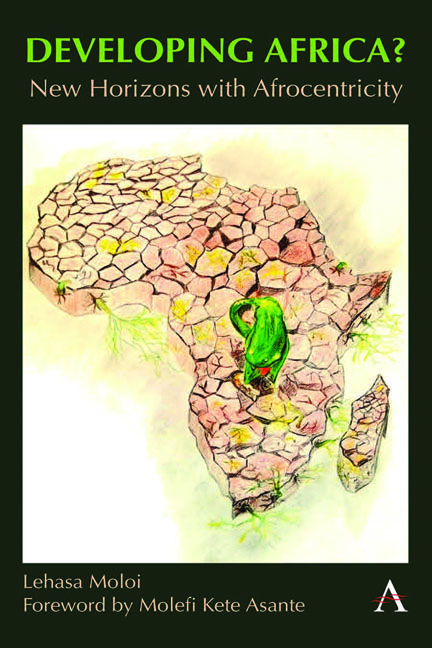Book contents
- Frontmatter
- Contents
- Foreword
- Preface
- Acknowledgements
- Relevance of the Dialogue
- Overview of the Book
- 1 Introduction
- 2 Theoretical Grounding: Afrocentricity’s Approach to Development
- 3 Critique of Eurocentrism and a Mapping of African Development Initiatives
- 4 Afrocentricity on the Significance of African History for Development
- 5 Afrocentricity on the Significance of Culture in the Conceptualization of an African Development Paradigm
- 6 Afrocentricity on the Significance of African Agency in Development in Africa
- Bibliography
- Index
4 - Afrocentricity on the Significance of African History for Development
Published online by Cambridge University Press: 13 April 2024
- Frontmatter
- Contents
- Foreword
- Preface
- Acknowledgements
- Relevance of the Dialogue
- Overview of the Book
- 1 Introduction
- 2 Theoretical Grounding: Afrocentricity’s Approach to Development
- 3 Critique of Eurocentrism and a Mapping of African Development Initiatives
- 4 Afrocentricity on the Significance of African History for Development
- 5 Afrocentricity on the Significance of Culture in the Conceptualization of an African Development Paradigm
- 6 Afrocentricity on the Significance of African Agency in Development in Africa
- Bibliography
- Index
Summary
Marcus Garvey, a noted Pan-Africanist activist, journalist and entrepreneur, wrote that ‘a people without knowledge of their historical past and culture is like a tree without roots. When all we know is the history written by those who conquered us, we remain shackled and submerged beneath their own narratives.’
The story of Africa's development trajectory must be anchored within our own African narratives. Throughout its unfolding as a theory of social change, Afrocentricity has consistently and systematically rewritten African history as a contribution to African development itself, and as part of the broader agenda of the restoration of African humanity. The objective of an Afrocentric historicism is to rediscover Africa's contributions to human civilization as the launching pad for Africa's rediscovery of itself, as opposed to the current habit of Africans always seeking to adjust to the European game plan. Thus, in Afrocentricity, an understanding of the corrected record of Africa's historical trajectory is a prerequisite for Africa's reconceptualization of its own development ideal. At the centre of an African reawakening must lie the imperative of understanding how the people of this continent have lived in their own environment to improve their quality of life. This implies that consistently and systematically challenging Eurocentric negative tropes about Africa as an uncivilized, unmodern, underdeveloped and backward continent is part of Afrocentricity's work of reclaiming their history from Eurocentric distortions and of countering the falsification of information about Africa.
The theft of Africa's history has gone hand in hand with a denial of African genius and agency. The consistent pattern of the negation of Africa by European writers has contributed to a denigration of African voices and to a devaluing of African contributions to world civilization. It is against this pervasive European epistemic injustice against Africans that Afrocentricity as a paradigm of the African Renaissance is committed to addressing the need for history to be reinterpreted from a perspective in which African people stand as subjects and not objects of European analysis. Moreover, Afrocentric historiography provides a clearer perspective on Africa's pursuit for Africa's own advancement. Thus, the discourse of development in Africa must be liberated from the factors that have negatively shaped Africa and its people, relegating them to the lower political, social and economic structures of the modern world system, which continues to be dominated by Europe and North America.
- Type
- Chapter
- Information
- Developing Africa?New Horizons with Afrocentricity, pp. 65 - 86Publisher: Anthem PressPrint publication year: 2024

